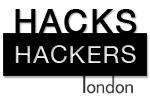“Supporting public interest business journalism” - Maha Rafi Atal at Hacks/Hackers London

Last night was the monthly Hacks/Hackers London meet-up organised by Joanna Geary and Jonathan Richards. It was a little more low-key than usual, with, I think, the damp weather dampening attendance. I did suggest that maybe TfL need to introduce a new function on JourneyPlanner to plot the driest route from A to B in London. Anyway, here are my notes from one of the talks, given by Maha Rafi Atal, about Public Business.
“Public Business: A new way of supporting public interest journalism” - Maha Rafi Atal
Maha Rafi Atal started her talk by describing the cognitive dissonance of studying to be a business journalist, with the ethics and aspirations that involves, with the day-to-day reality of business journalism as it occurs in newsrooms. Whilst the financial crisis was unfolding, she explained, at the time when the public most needed an understanding of what was happening, the ability for news organisations to do decent business coverage was contracting.
In part, she said, this is because it is a highly technical and specialised area of reporting, and journalists are no longer able to get the training they need in reading company reports or state finance predictions. This is especially crucial when a story like financial collapse is moving from the specialist business pages into being the main splash of the day. There is a skills gap at the intersections where stories might be involving both the business and the politics desk, or the business and the science desk.
She suggested that business reporting was uniquely conflicted. Unlike any other area of a news organisation, the business desk has to report directly on the very companies that are bankrolling the operation via advertising. The drive for 24 hour digital news has increased everybody’s output to the extent that journalists have to rely on keeping contacts at big companies happy in order to be able to churn out the required number of stories a day, and the increasing scarcity of advertising dollars means it is now much harder for an organisation to run stories that might “burn” an advertising account with negative coverage. She described this as “the dual capture of journalists”.
Public Business started as a research project to try and find out these things about business journalism, and Maha said they rather naively fixed up interviews with editors, walked in knowing nothing, and basically asked “So why are you doing this all wrong then?” Which sounded somehow vaguely familiar to me.
The premise now is that people can apply to Public Business for funding to support investigative business journalism, or projects that are too costly or time-consuming for a newsroom to undertake. They are also building a platform to encourage collaboration between journalists and academic researchers.
Maha made the point that people had actually spotted that the housing crash was coming, or the off-shore drilling by a particular company was a disaster waiting to happen, but that often these claims were based on research that didn’t get published until it was issued as a mighty academic tome two years later that no journalist was ever going to read beyond the abstract anyway. The idea is that people receiving grants from Public Business will do their journalistic endeavours on the platform, making that available for researchers to collaborate - it sounds something like Help Me Investigate but with a specific focus on business reporting.
Maha Rafi Atal was very passionate that decent reporting of the financial sector was a vital public service. “We are all investors now” she said, pointing out that anyone with a pension, whether they actively manage it or not, effectively owns a basket of shares in companies. There is a duty to help people understand that.
Maha finished with an appeal for donations, and, since this was Hacks/Hackers an appeal for developers to help work on the platform side of the service. You can contact Public Business via Twitter - @publicbusiness - or on email: publicbusinessmedia@gmail.com.
Next...
Next up I’ll have my notes from Nick Petrie and Ben Whitelaw talking about Wannabe Hacks. In the meantime you can pick up my Kindle compilation of notes from previous Hacks/Hackers London meet-ups.
“Hacks/Hackers London: Notes from the talks” brings together notes from 16 talks, including those from Martin Rosenbaum, Stephen Grey, Alastair Dant, Scott Byrne-Fraser and Wendy Grossman. It looks at topics of interest to journalists and programers alike, including freedom of information, processing big data sets to tell stories, social activism hack camps, the future of interactive technologies, and using social media to cover your tracks - or uncover those of somebody else.
“Hacks/Hackers London: Notes from the talks” for Kindle is £1.14.
